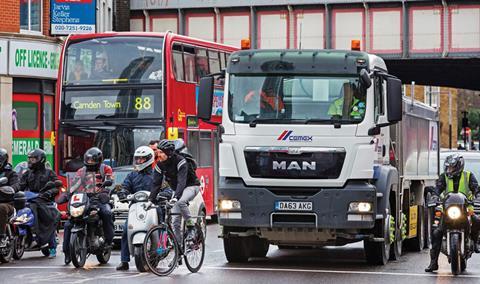
TfL has released interim tables showing the first batch of HGVs to be star-rated under the Direct Vision Standard (DVS), while seemingly also softening the impact of the scheme on hauliers.
Revealed last year, the standard is seeking to introduce a rating system running from zero to five based on the level of direct vision a driver has from their cab.
Trucks with the lowest, zero rating would have been banned from London by 2020, with only those achieving three stars or above permitted entry from 2024.
However, the update, published late last week after calls for more information, contains a new proposal to develop an HGV safety standard, which would recognise equipment such as cameras and audible warning devices fitted to trucks.
If approved, the proposal would see all HGVs over 12-tonnes requiring a permit to enter London from 2020.
Those with a DVS rating of one star and above would then automatically be granted a permit, while those trucks rated as zero would have to have sensors, visual warnings and undertake ‘comprehensive’ driver training before a permit is granted.
TfL added that the safety permit scheme would “evolve over time, taking into account advances in technology”.
From 2024 only those rated three stars and above, or which have an advanced safety system, would be allowed on London's streets. The details of the advanced safety system will be included in an autumn consultation.
There has previously been no dispensation for in-direct aids despite hauliers having spent thousands of pounds on them in recent years to improve cyclist and pedestrian safety.
Trade associations gave the latest plan a cautious welcome but said more detail around star ratings was still required.
RHA chief executive Richard Burnett said: “This only highlights the scale of the issue and reaffirms what we’ve been saying for some time, that the vast proportion of existing HGVs will not meet their currently proposed standards.

“It is positive that we now have an opportunity to work with TfL and the industry to find an effective solution to improve road safety in a balanced way and to have recognition that the issue is complex and will require a lot more work to ensure that the best possible road safety benefits are obtained.”
Burnett added that the RHA would be pushing for reassurance from TfL that any charges for the new permit scheme would cover its administration only, and not amount to a “tax on operators”.
Natalie Chapman, FTA head of policy for London, said: “FTA has always argued that, in the long term, the really significant road safety improvements we want will be delivered through technology, and we are glad that this point, which we have made repeated to the mayor and TfL, is now being listened to.
“However, to ensure that the capital’s businesses are able to plan and function effectively, it is imperative we have clarity as soon as possible about what the final DVS scheme is going to require.”
Renault Trucks commercial director Nigel Butler said: “Renault has worked closely with TfL throughout this consultation. While we have a number of questions regarding the interim DVS ratings, we hope that these can be resolved before the next consultation phase in the autumn.
“We believe the proposal for a ‘safety standard permit scheme’ is a sensible one, in particular if it builds on the learning from the existing FORS and CLOCS initiatives.”














